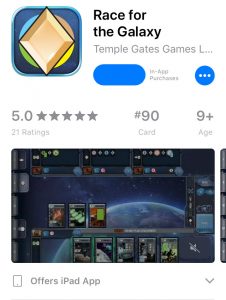
Ok, so in the intro to this series, I waxed poetic about being objective, but today I’m going to talk about my favorite game of all time: Race for the Galaxy by Thomas Lehmann. For frame of reference, as I talk about this app, I have (based on logged plays) played games in the iOS app 249 times at the time of this writing. (HOLY BALLS! -Ed.)
For the uninitiated, Race for the Galaxy is a strategic engine building game — possibly one of the best — about creating a space civilization. You build a tableau of cards in front of you, and in elegant fashion, you play a card in front of you by sacrificing other cards. In fact, other than a few cardboard chits, this game (in physical form) is all cards.
Apart from a few cardboard tokens, the physical version of Race for the Galaxy is all cards
The core mechanic of this game is simultaneous action selection (also called role-taking) in which you choose from a set of different actions each round, and reveal them simultaneously. Choosing an action gives you a bonus perk for performing that action. All of your opponents also choose their own actions. You always have the option of taking every action your opponents select, but if an action is not selected, it does not happen in the round.
The various roles you can select are listed along the left side of the screen
This provides an interesting tactical dichotomy of both trying to predict what your opponents may select, and trying to prioritize doing the action you need or want most. While much of this game feels like a solitary experience, the action selection is a sneaky bit of player interaction. There are several strategies you can take to win, but the game plays out until someone builds their 12th card to their tableau or the victory point chits are gone. For Ryan’s review of this game, you can watch his Find the Fun video here.
While I love this game, it has quite a few barriers that make it hard to teach and learn, which has probably affected its popularity (it sits somewhere around 51st on the BGG Top 100-ranked games at the time of writing). Let’s put my enjoyment of the game aside, and talk about the app. In this review, I talk about the things I like (DMExalts), and the things I don’t like (DMExcoriates) about the Race for the Galaxy app. In particular, I am mostly talking about the iOS implementation, but I’ve heard that the Android and Steam versions operate in much the same way.
DMExalts
- The User Interface: The user interface of this app is fairly intuitive. Most actions are achieved by dragging cards around the screen, and swiping them away to discard. There’s also an undo button, which is really good if you are playing quickly! One of the best features is that simply clicking on a card brings up the card to a larger view with text that explains what the symbols on the card mean. The UI could also fall into the ‘DMExcoriates’ category; if someone is unfamiliar with the game, they really have no idea what to do to begin with, so the UI could seem fiddly. This brings me to…
- The tutorial: As difficult as this game can be to teach, the tutorial does a good job of showing how the system works and how to use the UI. In other words, it shows you how to use the app. It also shows you what the different actions do, and introduces you to building an engine of cards that harmonize together. It covers some of the alternate strategies to win (military, trading, etc.), and really does a good job. However, I think this is still best supplemented by Ryan’s How to Play video.
- No shuffling cards: This is pretty self-explanatory, but with 114 cards in the base game deck, shuffling in the physical game is a big hassle.
- Speed of play: I can easily play a game in 15 minutes or less (maybe 20-25 minutes for a new player) on the app, while I would double that play time in the physical version.
- AI: The AI is a trained neural network, which means it is HARD to play against! Even as an experienced player, I am lucky to win 25% of the time against the Hard AI setting. This is great, as playing is a real challenge, and it makes you better at games against humans. It is also good to learn what dominant strategies the AI attempts, and to test them out on your own. For more on why neural net based AI’s are tough to play against, you might want to check out this article about the Viticulture AI.
- Online play: Online play is fairly simple to implement. There is no need to log on to a separate service. Your profile simply has a friend code that you can share with your friends (say, whoever you meet from the Nights Around a Table discord server). Then, create a game, and you’re off! As long as the person setting up the game owns the expansions, you can play with those as well. These can be set up to notify you when it’s your turn and works well for synchronous and asynchronous play.
- Goods display: The way that goods are displayed is really helpful. When they get added to worlds, they change to the correct color and shrink to fit, which is not possible in the physical game. When you choose the Trade action, the goods display how many cards you will get in exchange for discarding one. These are big value adds that are actually better than the physical version.
My (losing) tableau
DMExcoriates
- The rules document. It’s really insufficient for learning what you need to do to be good at the game. I think the tutorial and supplement How to Play video are required prerequisites if you are new to the game.
- The art: Ryan comments on this in his Find the Fun video, but the art for Race for the Galaxy is… not great? The app is very true to the source material, and so as a result, the art for the app is equally not great.
- The opponents tableaus are “obscured”: it is possible to view your opponent’s tableaus, they can be seen in brief on the top of the screen, and you can click on that area to expand the tableau, but this is far less convenient than looking across the table. This makes it hard to predict what the opponents will choose as their role.
Closeup of an opponent’s tableau
- Runaway games: In the physical version, it can be really hard to tell who is winning at any given time, which makes the final score count tense and exciting. It can be hard to tell if you should rush the endgame, or if you should milk your engine for more points first. In the digital version, the score is tracked real-time, so that decision is made clear. That can be fun, if you are winning, or miserable, if your opponent is doing it to you, and there isn’t anything you can do about it.
- Expansion cost: The game runs between $7.99-$9.99 (US), but each expansion costs $3.99. In other words, if you want the three available expansions, you’ll pay more than the cost of the base game for what generally amounts to additional cards. The Gathering Storm expansion adds the most to the game, adding goal tiles, but it is in no way essential to the game.
Final Thoughts
The Race for the Galaxy app on iOS is really well implemented, and I can easily recommend it (and the forthcoming Roll for the Galaxy app by the same developer). In many cases, I actually prefer the digital implementation to the physical. While it has some flaws (namely, it is true to the original art), I think that this app is great for anyone who believes they will like the game, or anyone who already likes the game. If the game isn’t for you, don’t buy the app. It’s really as simple as that. If you like the game, I would also recommend the Gathering Storm expansion, and enabling the New Worlds mini expansion for all plays.
Have you tried the Race for the Galaxy app? What are your thoughts? Let me know in the comments!

Dr. Benjamin McPheron
Contributor
Ben (or Dr. McPheron of DMExplains) is an associate professor of Electrical Engineering and a hobby Youtuber, making videos primarily for the purpose of engineering education, although he occasionally dabbles in music parodies. He is an avid board gamer, and enjoys playing a variety of games with a preference towards heavy economic games. His favorite games include Race for the Galaxy, Agricola, Brass: Birmingham, Pipeline and Vinhos Deluxe.


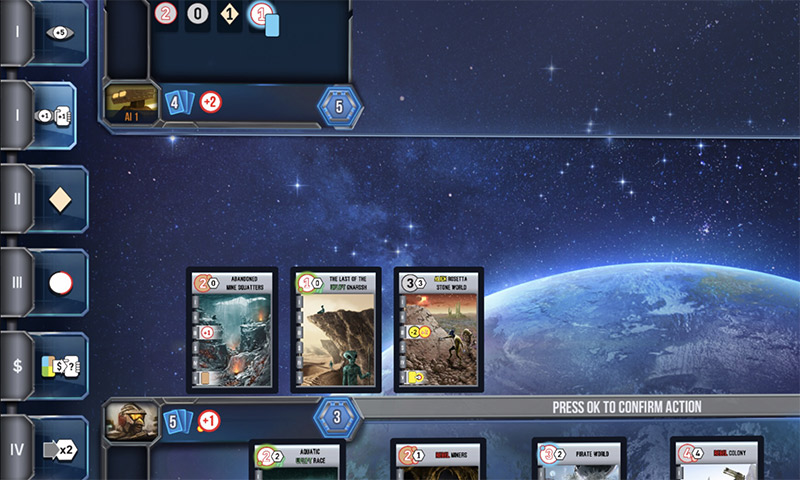
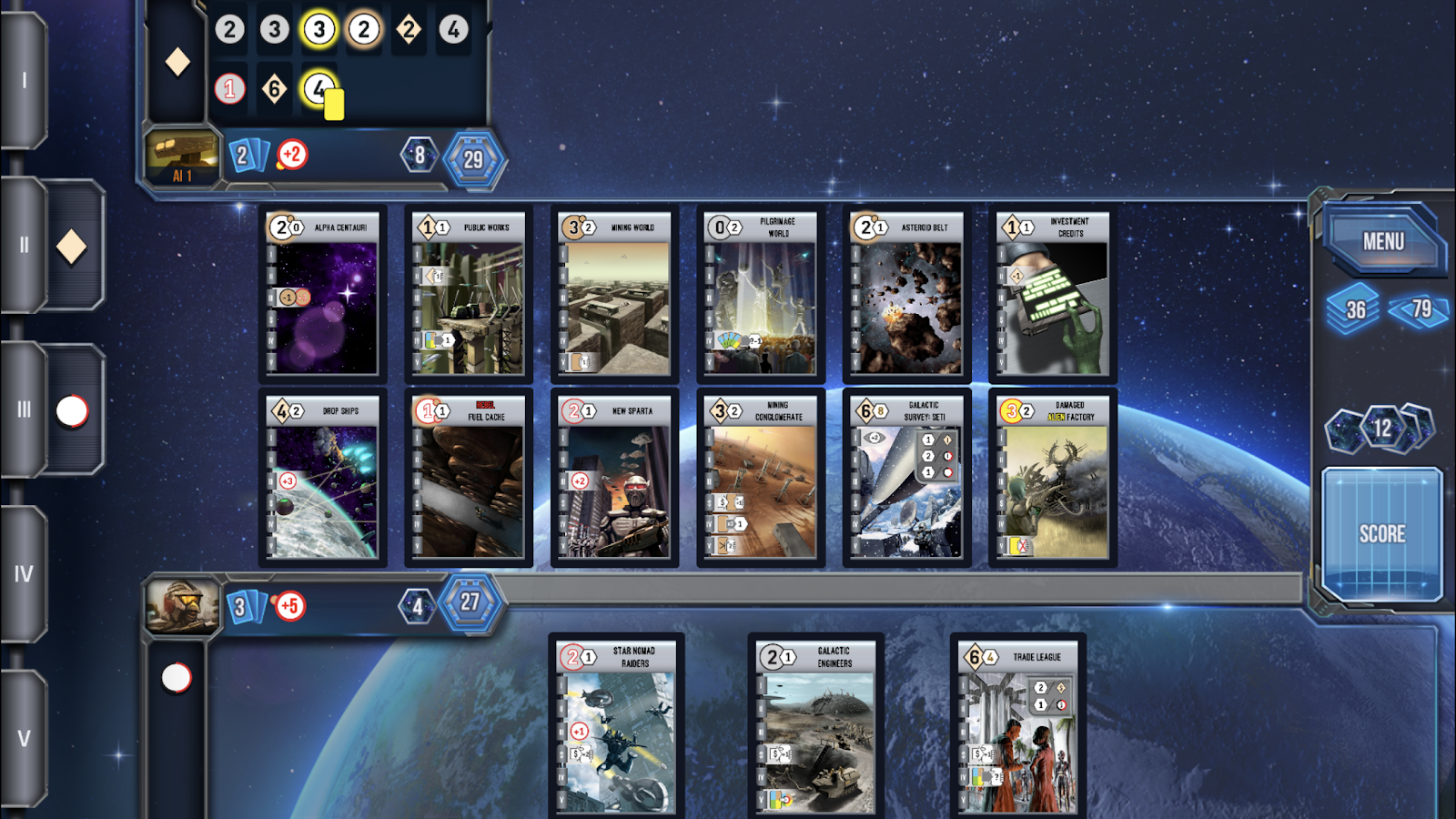
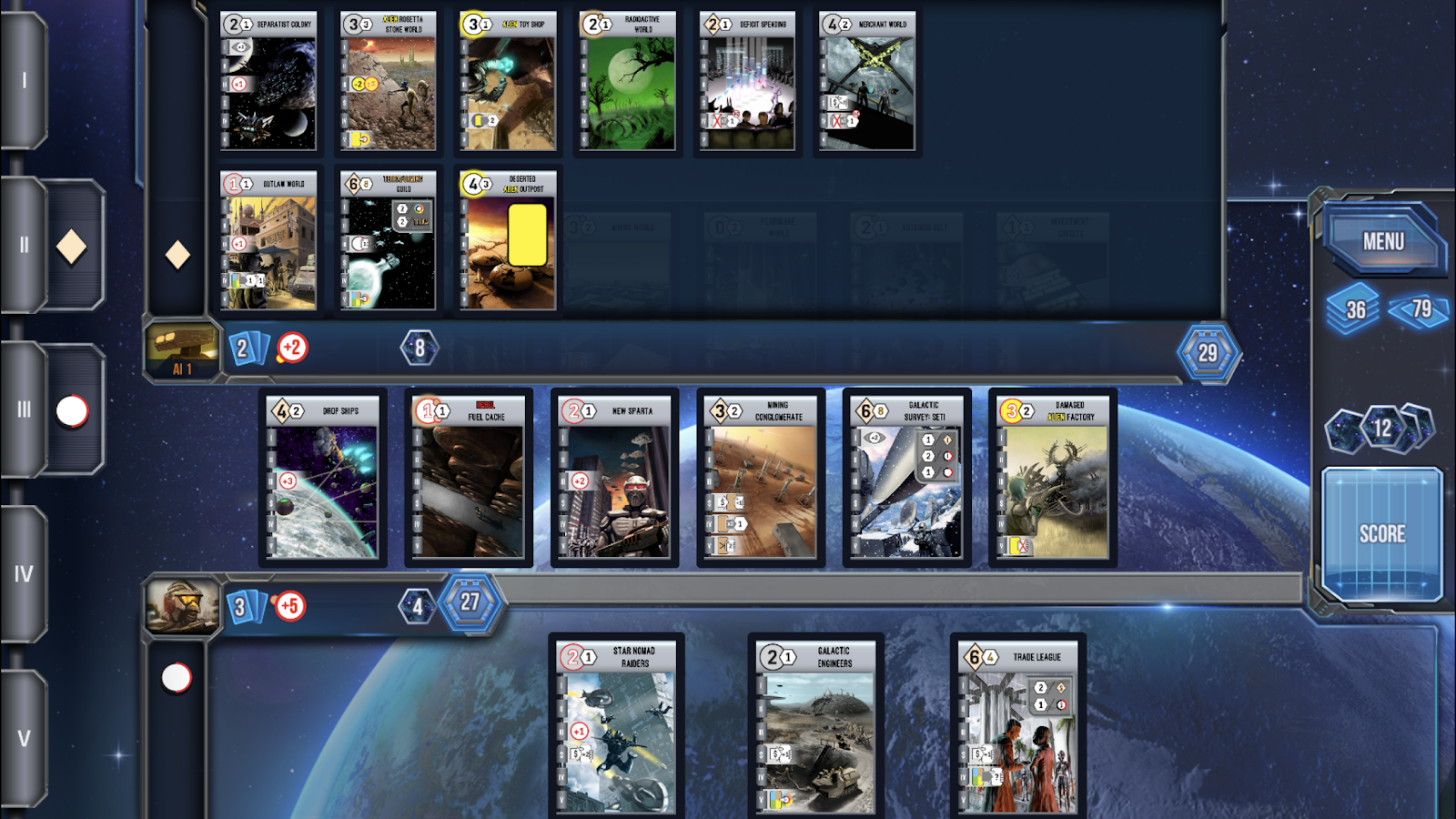
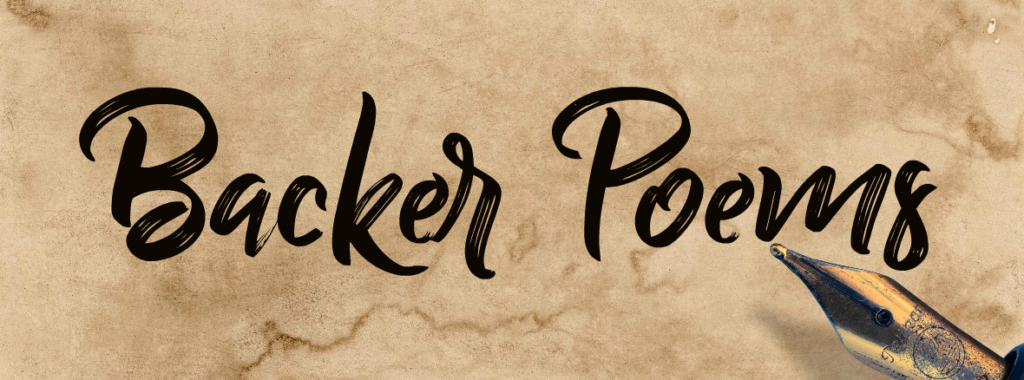





Trackbacks/Pingbacks